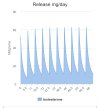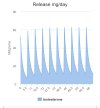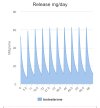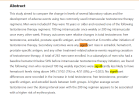Testosterone e/c are the two most commonly used esters, both of which are referred to in this study as shorter acting. Both e and c, injected once weekly, produced the highest incidence of erythrocytosis. Test u produced the lowest. Extrapolate out those findings and you’ll conclude that more frequent injections (once weekly vs e6w) caused erythrocytosis, therefore even more frequent administration of e/c (or even shorter esters) would amplify those effects. The only way around that would be if you did daily injections that mimicked natural levels, which would mean a very small amount of prop or TPP daily. Figure something like 10mg TPP or prop would be the upper limit of that.
I stand corrected for the testosterone form on shorter acting.
The study I linked atleast compared the same drug, but different frequency. your study is compared 1 drug at one frequency vs many other drugs at their own. That isnt how your interpret studies, you can only draw a hypothesis from this and need another study to confirm it.
However, it even states that Test E has a half life of 4-5 and Test C is 7-8.
It isnt fair to compare a weekly shot of half life of 5-8 days to something that has a half life of 5-6 weeks.
There are 3 conclusions that can be drawn here.
1.is that less injections of testosterone of any ESTER will create a peak.
2. that less hormonal fluctuations create a peak
3. Test U creates less issues vs test E/C(Which I think is the point of the study) as it compares to the other forms with a consistent delivery system.
Now they havent had as many studies of this lately but just assuming on the practice of the "better" TRT clinics increase injection frequency who deal with erthrocytosis on patients regularly. I do not see them typically advise 1 day a week.
Test E once every 7 days
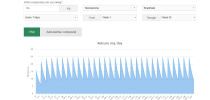
Once every 9 weeks (I cant do 9) for something that has a half life of 33 days?

To draw a conclusion that less test E/C injections would create less EPO levels is a little off.
If you really wanted to follow off of what your study found, go do test U regularly.
There is a SUBQ study that was funded by a SUBQ Test E smartpen that claims less issues with hct because of daily injections. Xyosted
I guess you can draw your own conclusion from this study, but I do not necessarily agree with your interpretation. I also do not believe that was the point of your study.
The conclusion(from my perspective) is that Test U is a better option for those that suffer from Erythrocytosis from Test E/C WEEKLY injections.
More importantly. Association/Correlation is not causation.


